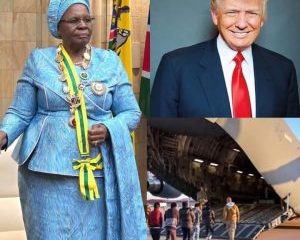News
Cholera: Tinubu orders cabinet to set up committee on emergencies

President Bola Tinubu has directed the establishment of a cabinet committee to oversee the Cholera emergency operation centre operated by the National Centre for Disease Control (NCDC).
Coordinating Minister of Health and Social Welfare, Prof. Ali Pate, made this known yesterday after the Federal Executive Council (FEC) meeting chaired by Tinubu at the State House, Abuja.
The Minister said the cabinet committee comprises members from the Federal Ministries of Health, Finance, Water Resources, Environment, Youth, Aviation, and Education.
He added that the committee’s efforts are in addition to the state government’s support to ensure Nigeria makes progress in reducing open defecation and other developmental issues aiding cholera spread.
“The Council approved a cabinet committee comprising the Federal Ministries of Health, Finance, Water Resources, Environment, Youth, Aviation, and Education, as some of our children will be returning to school.
“In addition to this, the state government will be co-opted to ensure Nigeria makes progress in reducing open defecation, as cholera is a developmental issue that requires a multi-sectoral approach,” Pate explained.
Meanwhile, some states have adopted strategies to overcome the prevalence of cholera. These include chlorination of water, and awareness and education of the people on proper hygiene.
The Gombe State government said though the state is free of cholera outbreak, it has started distributing chlorine to the 11 local government areas as part of measures to mitigate cholera spread.
Its Waste Manager, Gombe State Environmental Protection Agency (GOSEPA), Dr Umar Musa, in an interview with the News Agency of Nigeria (NAN) yesterday, said the targeted areas are wells, stagnant ponds and reservoirs, while areas that fetch water from rivers would get aqua tabs.
He explained: “Chlorine will destroy pathogens in water which contain the bacterium called Vibrio Cholerae which causes cholera infection and other water-borne diseases.”
The manager, who said the chlorine distribution would continue until December, added that 110 trained personnel are handling the distribution.
“The use of chlorine was the preventive method Gombe State also adopted in 2023 and it yielded positive results because there was no single case of cholera recorded.
Also, the Anambra State Government, which said it had not recorded any case of cholera, through its Commissioner for Health, Dr Afam Obidike, said in Awka, the state capital that the ministry has, nevertheless, activated Emergency Response Teams across the 21 local government areas.
“Emergency response teams are also actively conducting surveillance in communities in the 21 LGAs to promptly identify and contain any potential cases.
“We have commenced public campaigns to raise awareness about cholera and emphasise preventive measures in homes and communities.
“The media has been engaged to disseminate crucial information and educate the public about the signs, symptoms, and preventive strategies for cholera,” he said.
For some schools in the Federal Capital Territory (FCT), precaution is the watchword.
FCT Minister of State, Dr. Mariya Mahmoud, called on the FCT Primary Health Care Board to put in place measures to guard against the outbreak of cholera epidemic that has ravaged some states in Nigeria.
The minister made this call while taking briefs from the Director of the FCT Primary Health Care Board at the 190th FCT Joint Account Allocation Committee (JAAC) meeting in her office.
Mahmoud, who expressed satisfaction over the non-reported case of the epidemic in the nation’s capital, however, warned that as the seat of government necessary measures should be put in place to avoid any outbreak of the disease.
“I am indeed delighted that no case of the cholera epidemic has been reported in any of our primary healthcare centres across the six area councils in the FCT.
“However, that does not give us room to relax because this is the seat of government. The FCT Primary Health Care Board should put in place measures to guard against any outbreak of the disease.
“By now, I was expecting the board to commence radio jingles in different major languages and sensitization programmes in our schools, markets, mosques and churches. We should not give room for the outbreak before we start the fire brigade approach. That will not be acceptable,” she warned.
When NAN visited some of the schools yesterday in Gwagwalada, it observed that most schools have water drums and soap at designated places for pupils and teachers to wash their hands.
The move, they said, is to ensure availability of potable water for the pupils and others.
The Assistant Headmaster, Administration, Pilot Science Primary School, Mr Ismaila Gishe, said the Local Education Authority (LEA) recently provided plastic water drums and purifiers to purify the water before the pupils could drink it.
The Ogun State House of Assembly yesterday urged relevant government agencies to collaborate with local governments for proactive measures in containing the spread of cholera in the state.
The House’s members, led by the Speaker, Oludaisi Elemide (APC-Odeda), made the call during plenary.
Elemide commended the state government for its prompt intervention through the purchase of protective kits meant for the prevention of the spread.
He solicited the collaboration of relevant agencies and the Department of Public Health and Sanitation at the local government level.
Earlier, Wahab Haruna (APC-Yewa North I) had underscored the need to enforce compliance with public health precautions and promotion of hygiene by private food vendors to save the citizens.
Haruna who is Chairman, House Committee on Health, also explained the need for residents to take precautions to halt the spread of the disease.
In Oyo State, some residents of Ibadan, said the disease outbreak had compelled them to reconsider their eating habits and develop mechanisms to keep up with the situation
A motor mechanic at the Scout Camp area of the town, Mr Wale Adeyemi, says others like him feel hit the most being artisans.
According to him, since artisans rarely cook at work, they depend on food vendors but now they have started bringing food from home.
“One can’t expect people like us to cook when we are at our workshops. We buy food to eat as the only food most of us have at home is dinner.
“We have food hawkers who come daily to sell to us but now, many of us don’t patronise them again.
“Now, as my wife is packing the food for the children, she’s packing mine along. I also take garri and groundnuts or bread to ensure I have at least two meals at work.
“I’m not buying food from anyone until the government announces there’s no more cholera in Ibadan,” he said.
A pepper seller at Challenge, Mrs Basirat Lawal, likens this period to the days of COVID-19, as she recalled the precautionary measure of the COVID-19 days being replayed.
Lawal says she’s practising regular handwashing and mindful of where she buys her cooked foods.
“Since I heard about the cholera incident and learnt it started from drinking tiger nuts, I have stopped buying zobo from my customer.
“If I don’t bring food from home, I buy food from just one person because I trust her cooking hygiene, or I simply buy bread and coke.
Meanwhile, a barber, Mr Ahmeed Yinusa, described the experience restraining him from eating from different sources as the toughest in his over 30 years of existence.
News
Presidency slams El-Rufai over plot to woo Buhari

The Presidency and the ruling All Progressives Congress have dismissed the prospect of any opposition coalition unseating President Bola Tinubu in 2027, describing recent moves by former Vice President Atiku Abubakar and ex-Kaduna State Governor, Nasir El-Rufai, as futile and politically opportunistic.
Their reactions followed the high-profile visit by Atiku and El-Rufai—accompanied by former governors Aminu Tambuwal (Sokoto), Gabriel Suswam (Benue), Jibrilla Bindow (Adamawa), and Achike Udenwa (Imo)—to former President Muhammadu Buhari at his Kaduna residence last week.
Although Atiku maintained the visit was merely a post-Sallah courtesy call, political observers and members of the ruling party believe it was part of broader opposition coalition talks aimed at weakening Tinubu’s political base.
“There is a plan for the major political parties to come together and form a strong opposition. But it is not part of our visit,” Atiku told reporters.
In recent weeks, concerns have risen within the APC over speculated coalition efforts and the potential exit of the Congress for Progressive Change bloc from the party, following defections to the Social Democratic Party.
But the APC’s National Secretary, Senator Ajibola Bashiru, waved off the speculations in a phone interview with The PUNCH, questioning the credibility of the so-called CPC defection narrative.
“It is not true. Which CPC bloc did you people say is leaving? Was El-Rufai or Atiku a CPC member? Is our Vice National Chairman (North-West), Garba Datti Mohammed, and even former Governor Al-Makura not in the CPC? Have you heard any of them saying he is leaving?” Bashiru queried. “I don’t know why the media keeps giving these sorts of people unnecessary attention.”
Also reacting, President Tinubu’s Special Adviser on Policy Communication, Daniel Bwala, criticised the coalition talks, dismissing them as a desperate power grab by political misfits with no shared ideology.
“This coalition is an association to grab power,” Bwala said. “That’s why you will hear Peter Obi say they are only there to grab power. Tomorrow, he will say he is considering joining. As for my senior brother, El-Rufai, I like what he is doing. He is using them to play ping pong.”
Bwala added that internal resistance within the Peoples Democratic Party had already disrupted El-Rufai’s attempts to lure the opposition into the SDP.
“When El-Rufai came, he thought he would move all of them to SDP. But His Excellency (Sule Lamido) screamed, ‘Hold it there!’ He reminded them that it was the PDP that made El-Rufai minister twice and gave him political relevance. Now, he wants to drag them out? We’re not going anywhere,” Bwala recounted.
The Presidency insists that despite the rising political noise, President Tinubu remained focused on governance and would not be distracted by alliances it described as unstable and self-serving.
Credit: PUNCH
News
Court dismisses suit seeking Oyo monarch’s removal

An Oyo State High Court sitting in Ibadan has dismissed a suit contesting the nomination and installation of the Olugbon of Orile Igbon, Oba Francis Alao.
In his ruling on Monday, Justice K.A. Adedokun nullified the case for lack of jurisdiction.
Four members of the Akingbola family who instituted the suit contested the selection, appointment, and approval of Oba Alao as the Olugbon.
Justice Adedokun held that the court lacked the jurisdiction to entertain the matter, saying that the claimants had no locus standi to file the suit.
He ruled that the case was defective as it failed to include Surulere Local Government, the authority legally empowered to initiate the selection process and approve the traditional ruler’s appointment.
Oba Alao, whose installation as Olugbon was ratified by the Oyo State government and traditional institutions, is the current vice chairman of the Oyo State Council of Obas and Chiefs.
News
EFCC arraigns Chinese for giving false information in Lagos

The Economic and Financial Crimes Commission (EFCC) has arraigned a Chinese, Liu Beixiang, over alleged false information to an officer of the agency.
Liu was arraigned yesterday before Justice Ayokule Faji of the Federal High Court sitting in Ikoyi, Lagos.
The charge reads: “That you, Liu Beixiang (a.k.a Lao Liu), sometime in December 2024 in Lagos, within the jurisdiction of this honourable court, did give information, which you knew to be false, to an officer of the Federal Government of Nigeria in the discharge of his duties and thereby committed an offence contrary to Section 16 (1) of the Economic and Financial Crimes Commission (Establishment) Act, 2004.”
The defendant, however, pleaded not guilty to the offence when the charge was read to him. In view of his plea, the prosecution counsel, Babatunde Sonoiki, asked the court for a trial date and also prayed that the defendant be remanded in a correctional facility.
But in his response, the defence counsel, F.A. Dalmeda, informed the court of an application submitted to the EFCC seeking a plea bargain.
“We filed an application for a plea bargain, and we also filed a motion for bail, which the EFCC responded to this morning.
“We need a date for us to report on the plea bargain.
Consequently, Justice Faji adjourned the matter till June 23, 2025, for a report on the plea bargain and remanded the defendant in a correctional centre.
-

 News19 hours ago
News19 hours agoJust in: Namibia Moves to Deport Over 500 Americans in Bold Visa Policy Shift
-

 News19 hours ago
News19 hours agoRivers women rally in support of state of emergency
-

 News14 hours ago
News14 hours agoYou must refund N300m, Rivers State tells NBA
-

 Politics18 hours ago
Politics18 hours agoBwala accuses Senator Ndume of plans to defect from APC
-

 Foreign15 hours ago
Foreign15 hours agoUS orders 30-day registration for all foreign nationals or face jail, deportation
-

 News19 hours ago
News19 hours agoSoldiers rescue 16 kidnapped passengers in Plateau
-

 News2 hours ago
News2 hours agoPeter Obi speaks as Benue govt. blocks humanitarian visit
-

 News19 hours ago
News19 hours agoGunmen invade Plateau community in fresh attack, Kill 40 People





